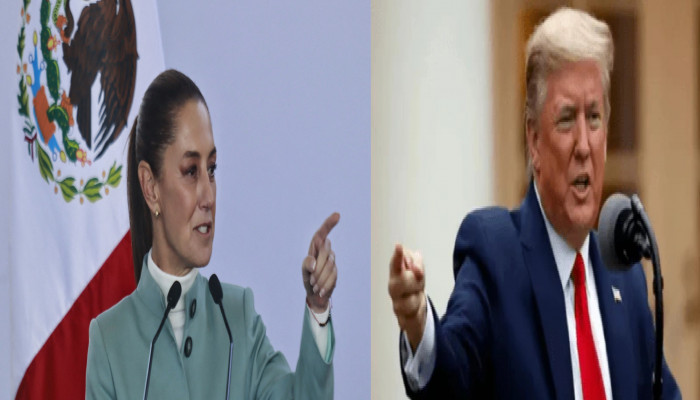Mexico warns Trump tariffs could cost 400,000 US jobs, vows retaliation
- In Reports
- 01:40 PM, Nov 28, 2024
- Myind Staff
On Wednesday, Mexican President Claudia Sheinbaum threatened to respond if US President-elect Donald Trump implemented his proposed 25% universal tax, a move her government said might result in the loss of 400,000 US jobs and raise prices for US consumers.
"If there are US tariffs, Mexico would also raise tariffs," Sheinbaum stated at a news conference, making it apparent that the nation was preparing potential trade retaliation against its largest trading partner. Speaking with Sheinbaum, Mexican Economy Minister Marcelo Ebrard advocated for more regional integration and cooperation rather than a war of retaliatory import levies.
"It's a shot in the foot," Ebrard said of Trump's proposed tariffs, which appear to violate the USMCA trade deal between Mexico, Canada and the US. Ebrard warned the tariffs would lead to massive US job losses and lower growth and hit US companies producing in Mexico by effectively doubling the taxes they paid. "The impact on companies is huge," he said. Ebrard mentioned that the new proposed tariffs would significantly affect major automotive companies that export across borders, including Ford, General Motors, and Stellantis. He pointed out that 88% of pickup trucks sold in the US are made in Mexico, and these vehicles would become more expensive. Pickup trucks are especially popular in rural areas, many of which voted for Trump. "Our estimate is that the average price of these vehicles will increase by $3,000," Ebrard said.
Sheinbaum and Trump had a phone conversation on Wednesday, where they talked about key issues on Trump's agenda. Trump mentioned that the tariffs would stay in place until the US could control the flow of drugs, especially fentanyl and migrants coming into the country. In a tweet on his Truth Social platform, Trump claimed that Sheinbaum "agreed to stop migration through Mexico, and into the United States, effectively closing our Southern Border." The discussion, he said, was "very productive." Later on X, Sheinbaum said she had explained to Trump Mexico's migration policy, which "attended to" migrants before they reached the US-Mexico border. "Mexico's stance is not to close borders, but to build bridges between governments and their peoples," she added.
In after-hours trading on Wednesday, Mexico's peso gained almost 1% against the dollar, recovering from losses in the previous days. Many experts believe Trump's tariff threats are more of a negotiation strategy than an actual trade policy. "The lack of a clear link between this threat and questions related to trade suggests the new president plans to use tariffs as a negotiating strategy to achieve goals largely unrelated to trade," said David Kohl, chief economist at Julius Baer. Mexico's automotive industry is the biggest manufacturing sector in the country, with most of its exports going to the United States. It makes up almost 25% of all vehicles produced in North America. Analysts at Barclays believe that the proposed tariffs could eliminate nearly all profits for the Detroit Three automakers.
"While it's generally understood that a blanket 25 per cent tariff on any vehicles or content from Mexico or Canada could be disruptive, investors under-appreciate how disruptive this could be," they wrote in a note on Tuesday. Trump's transition team spokesperson Brian Hughes claimed that the tariffs would shield American workers and industry from "unfair practices of foreign companies and foreign markets." Hughes stated that Trump would introduce policies aimed at making life more affordable and prosperous for Americans.
GM Ford and Stellantis refused to comment. Ford didn't say how the potential tariffs would impact its business but highlighted that it makes more vehicles in the U.S. than most other major automakers. Mexico's automotive industry group, AMIA, said it would prepare for any situation and wait to see what actions are officially taken. The Institute of International Finance, a global financial services trade group, warned that the relationship between Mexico and the U.S. would face challenges moving forward. "The imposition of tariffs, eventually leading to increased protectionism, and other policies affecting exchange rates and commodity prices could have significant implications for the region," it said in a note.
The USMCA is set to be reviewed in 2026. Katia Goya, the director of international economics at Grupo Financiero Banorte, believes that instead of simply extending the agreement as it is, the three USMCA countries will probably push for a complete renegotiation of the deal. "The effect of a trade-conflict situation is that it will mean lower economic growth in the United States, higher unemployment and higher inflation," Goya said. In the first nine months of this year, USMCA trade totalled $1.78 trillion, according to Ebrard. "We can fragment and divide with tariffs," Ebrard said. "Mexico does not want conflicts and divisions, but to build a stronger region."







Comments